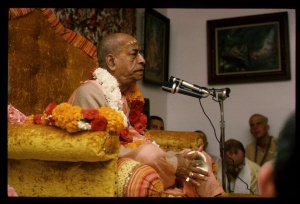SB 1.18.14: Difference between revisions
No edit summary |
(Vanibot #0054 edit - transform synonyms into clickable links, which search similar occurrences) |
||
| Line 24: | Line 24: | ||
<div class="synonyms"> | <div class="synonyms"> | ||
''kaḥ'' | ''[//vanipedia.org/wiki/Special:VaniSearch?s=kaḥ&tab=syno_o&ds=1 kaḥ]'' — who is he; ''[//vanipedia.org/wiki/Special:VaniSearch?s=nāma&tab=syno_o&ds=1 nāma]'' — specifically; ''[//vanipedia.org/wiki/Special:VaniSearch?s=tṛpyet&tab=syno_o&ds=1 tṛpyet]'' — get full satisfaction; ''[//vanipedia.org/wiki/Special:VaniSearch?s=rasa&tab=syno_o&ds=1 rasa]-[//vanipedia.org/wiki/Special:VaniSearch?s=vit&tab=syno_o&ds=1 vit]'' — expert in relishing mellow nectar; ''[//vanipedia.org/wiki/Special:VaniSearch?s=kathāyām&tab=syno_o&ds=1 kathāyām]'' — in the topics of; ''[//vanipedia.org/wiki/Special:VaniSearch?s=mahat&tab=syno_o&ds=1 mahat]-[//vanipedia.org/wiki/Special:VaniSearch?s=tama&tab=syno_o&ds=1 tama]'' — the greatest amongst the living beings; ''[//vanipedia.org/wiki/Special:VaniSearch?s=ekānta&tab=syno_o&ds=1 ekānta]'' — exclusively; ''[//vanipedia.org/wiki/Special:VaniSearch?s=parāyaṇasya&tab=syno_o&ds=1 parāyaṇasya]'' — of one who is the shelter of; ''[//vanipedia.org/wiki/Special:VaniSearch?s=na&tab=syno_o&ds=1 na]'' — never; ''[//vanipedia.org/wiki/Special:VaniSearch?s=antam&tab=syno_o&ds=1 antam]'' — end; ''[//vanipedia.org/wiki/Special:VaniSearch?s=guṇānām&tab=syno_o&ds=1 guṇānām]'' — of attributes; ''[//vanipedia.org/wiki/Special:VaniSearch?s=aguṇasya&tab=syno_o&ds=1 aguṇasya]'' — of the Transcendence; ''[//vanipedia.org/wiki/Special:VaniSearch?s=jagmuḥ&tab=syno_o&ds=1 jagmuḥ]'' — could ascertain; ''[//vanipedia.org/wiki/Special:VaniSearch?s=yoga&tab=syno_o&ds=1 yoga]-[//vanipedia.org/wiki/Special:VaniSearch?s=īśvarāḥ&tab=syno_o&ds=1 īśvarāḥ]'' — the lords of mystic power; ''[//vanipedia.org/wiki/Special:VaniSearch?s=ye&tab=syno_o&ds=1 ye]'' — all they; ''[//vanipedia.org/wiki/Special:VaniSearch?s=bhava&tab=syno_o&ds=1 bhava]'' — Lord Śiva; ''[//vanipedia.org/wiki/Special:VaniSearch?s=pādma&tab=syno_o&ds=1 pādma]'' — Lord Brahmā; ''[//vanipedia.org/wiki/Special:VaniSearch?s=mukhyāḥ&tab=syno_o&ds=1 mukhyāḥ]'' — heads. | ||
</div> | </div> | ||
Latest revision as of 18:04, 17 February 2024

A.C. Bhaktivedanta Swami Prabhupada
TEXT 14
- ko nāma tṛpyed rasavit kathāyāṁ
- mahattamaikānta-parāyaṇasya
- nāntaṁ guṇānām aguṇasya jagmur
- yogeśvarā ye bhava-pādma-mukhyāḥ
SYNONYMS
kaḥ — who is he; nāma — specifically; tṛpyet — get full satisfaction; rasa-vit — expert in relishing mellow nectar; kathāyām — in the topics of; mahat-tama — the greatest amongst the living beings; ekānta — exclusively; parāyaṇasya — of one who is the shelter of; na — never; antam — end; guṇānām — of attributes; aguṇasya — of the Transcendence; jagmuḥ — could ascertain; yoga-īśvarāḥ — the lords of mystic power; ye — all they; bhava — Lord Śiva; pādma — Lord Brahmā; mukhyāḥ — heads.
TRANSLATION
The Personality of Godhead, Lord Kṛṣṇa [Govinda], is the exclusive shelter for all great living beings, and His transcendental attributes cannot even be measured by such masters of mystic powers as Lord Śiva and Lord Brahmā. Can anyone who is expert in relishing nectar [rasa] ever be fully satiated by hearing topics about Him?
PURPORT
Lord Śiva and Lord Brahmā are two chiefs of the demigods. They are full of mystic powers. For example, Lord Śiva drank an ocean of poison of which one drop was sufficient to kill an ordinary living being. Similarly, Brahmā could create many powerful demigods, including Lord Śiva. So they are īśvaras, or lords of the universe. But they are not the supreme powerful. The supreme powerful is Govinda, Lord Kṛṣṇa. He is the Transcendence, and His transcendental attributes cannot be measured even by such powerful īśvaras as Śiva and Brahmā. Therefore Lord Kṛṣṇa is the exclusive shelter of the greatest of all living beings. Brahmā is counted amongst the living beings, but he is the greatest of all of us. And why is the greatest of all the living beings so much attached to the transcendental topics of Lord Kṛṣṇa? Because He is the reservoir of all enjoyment. Everyone wants to relish some kind of taste in everything, but one who is engaged in the transcendental loving service of the Lord can derive unlimited pleasure from such engagement. The Lord is unlimited, and His name, attributes, pastimes, entourage, variegatedness, etc. are unlimited, and those who relish them can do so unlimitedly and still not feel satiated. This fact is confirmed in the Padma Purāṇa:
- ramante yogino 'nante
- satyānanda-cid-ātmani
- iti rāma-padenāsau
- paraṁ brahmābhidhīyate
- (CC Madhya 9.29)
"The mystics derive unlimited transcendental pleasures from the Absolute Truth, and therefore the Supreme Absolute Truth, the Personality of Godhead, is also known as Rāma."
There is no end to such transcendental discourses. In mundane affairs there is the law of satiation, but in transcendence there is no such satiation. Sūta Gosvāmī desired to continue the topics of Lord Kṛṣṇa before the sages of Naimiṣāraṇya, and the sages also expressed their readiness to hear from him continuously. Since the Lord is transcendence and His attributes are transcendental, such discourses increase the receptive mood of the purified audience.